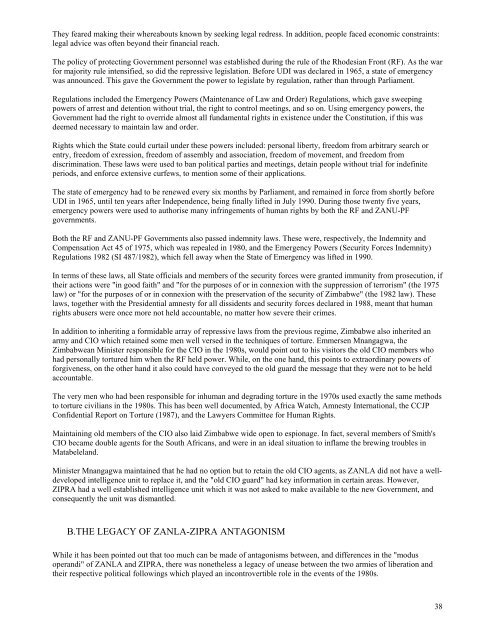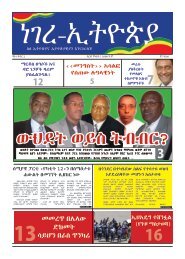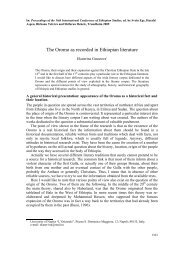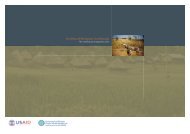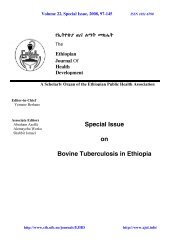MatabelelandReport
MatabelelandReport
MatabelelandReport
You also want an ePaper? Increase the reach of your titles
YUMPU automatically turns print PDFs into web optimized ePapers that Google loves.
They feared making their whereabouts known by seeking legal redress. In addition, people faced economic constraints:<br />
legal advice was often beyond their financial reach.<br />
The policy of protecting Government personnel was established during the rule of the Rhodesian Front (RF). As the war<br />
for majority rule intensified, so did the repressive legislation. Before UDI was declared in 1965, a state of emergency<br />
was announced. This gave the Government the power to legislate by regulation, rather than through Parliament.<br />
Regulations included the Emergency Powers (Maintenance of Law and Order) Regulations, which gave sweeping<br />
powers of arrest and detention without trial, the right to control meetings, and so on. Using emergency powers, the<br />
Government had the right to override almost all fundamental rights in existence under the Constitution, if this was<br />
deemed necessary to maintain law and order.<br />
Rights which the State could curtail under these powers included: personal liberty, freedom from arbitrary search or<br />
entry, freedom of exression, freedom of assembly and association, freedom of movement, and freedom from<br />
discrimination. These laws were used to ban political parties and meetings, detain people without trial for indefinite<br />
periods, and enforce extensive curfews, to mention some of their applications.<br />
The state of emergency had to be renewed every six months by Parliament, and remained in force from shortly before<br />
UDI in 1965, until ten years after Independence, being finally lifted in July 1990. During those twenty five years,<br />
emergency powers were used to authorise many infringements of human rights by both the RF and ZANU-PF<br />
governments.<br />
Both the RF and ZANU-PF Governments also passed indemnity laws. These were, respectively, the Indemnity and<br />
Compensation Act 45 of 1975, which was repealed in 1980, and the Emergency Powers (Security Forces Indemnity)<br />
Regulations 1982 (SI 487/1982), which fell away when the State of Emergency was lifted in 1990.<br />
In terms of these laws, all State officials and members of the security forces were granted immunity from prosecution, if<br />
their actions were "in good faith" and "for the purposes of or in connexion with the suppression of terrorism" (the 1975<br />
law) or "for the purposes of or in connexion with the preservation of the security of Zimbabwe" (the 1982 law). These<br />
laws, together with the Presidential amnesty for all dissidents and security forces declared in 1988, meant that human<br />
rights abusers were once more not held accountable, no matter how severe their crimes.<br />
In addition to inheriting a formidable array of repressive laws from the previous regime, Zimbabwe also inherited an<br />
army and CIO which retained some men well versed in the techniques of torture. Emmersen Mnangagwa, the<br />
Zimbabwean Minister responsible for the CIO in the 1980s, would point out to his visitors the old CIO members who<br />
had personally tortured him when the RF held power. While, on the one hand, this points to extraordinary powers of<br />
forgiveness, on the other hand it also could have conveyed to the old guard the message that they were not to be held<br />
accountable.<br />
The very men who had been responsible for inhuman and degrading torture in the 1970s used exactly the same methods<br />
to torture civilians in the 1980s. This has been well documented, by Africa Watch, Amnesty International, the CCJP<br />
Confidential Report on Torture (1987), and the Lawyers Committee for Human Rights.<br />
Maintaining old members of the CIO also laid Zimbabwe wide open to espionage. In fact, several members of Smith's<br />
CIO became double agents for the South Africans, and were in an ideal situation to inflame the brewing troubles in<br />
Matabeleland.<br />
Minister Mnangagwa maintained that he had no option but to retain the old CIO agents, as ZANLA did not have a welldeveloped<br />
intelligence unit to replace it, and the "old CIO guard" had key information in certain areas. However,<br />
ZIPRA had a well established intelligence unit which it was not asked to make available to the new Government, and<br />
consequently the unit was dismantled.<br />
B.THE LEGACY OF ZANLA-ZIPRA ANTAGONISM<br />
While it has been pointed out that too much can be made of antagonisms between, and differences in the "modus<br />
operandi" of ZANLA and ZIPRA, there was nonetheless a legacy of unease between the two armies of liberation and<br />
their respective political followings which played an incontrovertible role in the events of the 1980s.<br />
38


